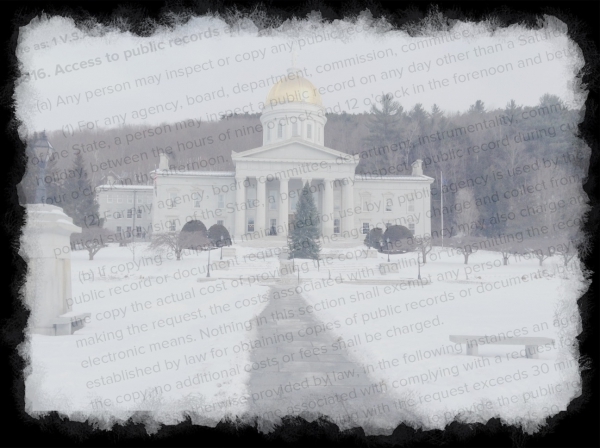Forty-two years ago, Vermont adopted the Public Records Act, a groundbreaking law that ensured the public got to see most records of state, municipal, and school governments.
It was pretty tight, with fewer than 30 exemptions allowing information to be kept secret.
No more. In the years since 1976, the law has been twisted and abused to the point where “public” is a misnomer. There are now 260 or 280 exemptions in the law - no one's really sure, because those secrecy exceptions are scattered across Vermont's voluminous law books - and those exemptions run to a remarkable 5,842 words.
Earlier this decade, in response to a clamor from Vermont journalists and activists, the Legislature tackled a four-year project to see how many of those exemptions are still needed.
But when legislators started asking questions about existing exemptions, state agencies came in with requests for more exemptions, and nobody wanted to give an inch on exemptions that were already in the law.
Basically, the legislative study committee threw up its hands.
Then Allen Gilbert, then head of the Vermont ACLU chapter, discovered that there were perhaps 500 or 600 more exemptions to the public records law. They weren't in the law at all; they were in the rules that agencies wrote for themselves, explaining how each law would be carried out.
Our newspapers ran headlong into this problem in 2012, when Vermont took a small step toward allowing use of medical marijuana.
The state government decided to set up three medical marijuana dispensaries, including one in Waterbury. When we tried to find out who was proposing it and where it would be, we were turned down. Not because of the law itself, which said nothing about a shroud of secrecy for proposed marijuana dispensaries. Rather, the Vermont Department of Public Safety snuck secrecy into the rules, which have the force of law.
And that has happened hundreds and hundreds of times, across a wide variety of state laws, unbeknownst to most legislators and government officials.
And now, here comes another proposed exemption.
* * *
State Sen. Robert “Bobby” Starr, D-Essex-Orleans, is pushing a bill to exempt farm-pollution-control plans from the Vermont Public Records Act. If the plans are public, Starr says, protesters might disrupt farmers.
“People have way too much time on their hands,” Starr told VTDigger. “People love to protest. This would just give them one more excuse to protest on farms where the farmer's under enough stress already.”
Starr's trying to give some legal cover to that secrecy by characterizing the pollution-control documents as “business plans” with proprietary information.
These “business plans” outline steps farmers take to keep manure and fertilizer from polluting rivers, streams, and lakes.
Why is pollution control a secret? Especially when Vermonters will plow tens of millions of dollars over the next 20 years into new farm practices that stem phosphorus pollution?
“Follow the money” is what the investigative reporters say, and tens of millions of dollars is a lot of money.
* * *
This is not strictly a Vermont problem. It's everywhere.
Damien Cave, a former colleague who's running The New York Times operations in Australia, reports this question from a reader in Canberra: “How can democracy be sustained and furthered in a world where Western governments are taking every opportunity to increase secrecy around their functions and reduce transparency of their actions and decisions?”
An ensuing panel discussion concluded that “most of today's leaders have simply not come to grips with the current moment of existential challenge for democracies: Politicians are still waltzing in a world where the stakes are small and intimately tied to their own party loyalty, their donors and re-election.
“What might it take for them to wake up, mature and reinvigorate government? What needs to happen for the public to be better informed and to demand more from their elected representatives?”
What, indeed.
* * *
In Vermont, the Public Records Act has become such a joke, it seems beyond redemption. Maybe we should just blow it up and start over.
Short of that, how about two modest proposals:
• Any new exemption to the Vermont Public Records Act must be specifically approved by the Legislature, not concocted by faceless bureaucrats who don't have to answer to the voters.
• Put every new exemption right in the law itself. Now, the exemptions are scattered throughout the state's law books, and they're hard to find. Can we at least put the new ones out there in the spotlight, where we all can see them?
A coalition of journalists and open-government advocates has been pushing for much stronger reforms, and let's hope they succeed.
But given the way the law has been distorted and watered down during its 42-year history, it's hard to feel much confidence.
